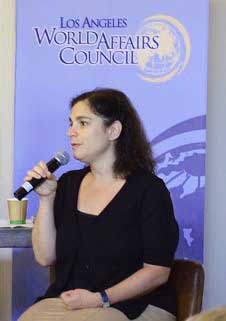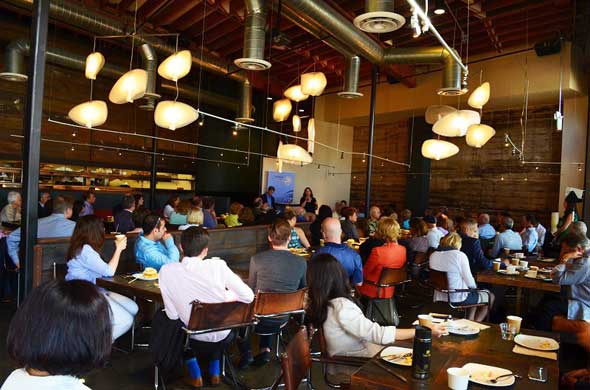
Asli Bâli
Ten days after the attempted coup in Turkey it is still unclear what exactly happened, who was responsible for planning the coup, and why it was so ineptly carried out, according to Asli Bâli, a law professor and director of the Center of Near Eastern Studies at UCLA. 246 people died in the attacks carried out in Ankara and Istanbul on July 15th, but the coup plotters failed to capture the President, Recep Tayyip Erdogan, and his prime minister Binali Yildirim, and they also were unable to shut down satellite communications and social media. This allowed Erdogan to appeal to people to come out onto the streets and face down the soldiers, effectively reversing the coup.
The fact that the coup was so badly planned "has led to a number of conflicting narratives" Bâli told a LAWAC Global Cafe breakfast meeting on July 26th. The government has accused the Turkish cleric Fethullah Gulen who lives in exile in Pennsylvania of organizing the coup. Some think the government had drawn up a list of its opponents who may have been plotting an uprising later on, causing the plotters to bring forward the date for the putsch and launching their attacks prematurely. And some government critics have argued Erdogan himself staged a sham coup which gave him the excuse to arrest and dismiss tens of thousands of his perceived opponents. Whatever the truth, Bâli says, "the proliferation of conspiracy theories speaks to the deep polarization in Turkish society."
Had the coup succeeded, Bâli said, "it would have led almost certainly to a civil war that would have been very bloody." She said it would have been a devastating outcome because it would also have sent the message that the only way to confront political Islam "is to use extra-political violence" - rather than the ballot box.
However after coup failed, Erdogan has launched a massive crackdown - one third of the country's generals have been arrested, and a total of some 90,000 soldiers, teachers, university professors, journalists and others have been dismissed from their jobs or detained. Despite the protests from European governments against the wide-ranging arrests and dismissals, Ergodan appears determined to root out all his perceived enemies in one massive purge, with little regard to due legal process. "These mass detentions without individual trials indicate a totalitarian impulse," said Bâli. They will set back indefinitely Turkey's application to join the European Union - and should Erdogan reintroduce the death penalty as he has suggested he might, that would reduce the country's chances of getting in to the EU to zero.
A deeper mystery surrounds the sudden lurch towards authoritarianism by Erdogan, who came to power in 2002 as a modernizing, pro-business, secular, anti-military political leader. He boosted Turkey's economy, improved the distribution of wealth and healthcare and had a very open foreign policy to all his Middle Eastern neighbors - and was closely aligned with Fethullah Gulen. However in 2010/11 the Arab Spring uprisings and the killing by Israeli commandos of 10 Turks on a flotilla bound for Gaza made Erdogan become much less tolerant of dissent, and also caused a rupture with Gulen.

In discussion with Asli Bâli
Since then Erdogan has ruled in a much more autocratic manner, stifling journalistic freedom and freedom on university campuses. All the time he feared that Gulen was building up a network of loyalists throughout the government, civil service and the military - which all came to a head in this month's coup.
The fall-out for the US is not insignificant - Turkey is a NATO member, and, as Bâli pointed out, "Turkey has the second largest number of troops in NATO" after the US. It is in a very strategic location at the entry to the Middle East, and the US has being using Incirlik airbase in eastern Turkey to fly bombing raids against ISIS in Syria. And Turkey has been very accommodating to the flow of Syrian refugees that Europe no longer is prepared to accept. So it is important that the US maintains a strong relationship with Turkey, and claims by some Turkish politicians - including cabinet members - that the US was somehow behind the coup are not helpful. Unfortunately it is a hallmark of authoritarian leaders to see enemies at every turn, and to act accordingly.
